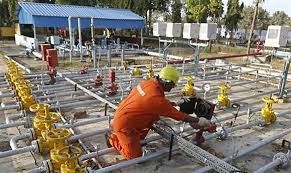 As subsidy bill balloons to $26 billion and oil and natural gas production stagnates, Petroleum Ministry feels national oil companies like ONGC losing focus on their core competence has led to this insipid situation.
As subsidy bill balloons to $26 billion and oil and natural gas production stagnates, Petroleum Ministry feels national oil companies like ONGC losing focus on their core competence has led to this insipid situation.
In a presentation prepared for the incoming Narendra Modi-government, the ministry listed national oil companies losing focus on domestic exploration as well as legal disputes around signed contracts with private explorers among the five things that went wrong during the United Progressive Alliance regime.
Alongside, it also said increasing cap on supply of subsidised domestic LPG cylinders from 6 to 9 and then to 12 per household in a year should not have happened, sources privy to the development said.
Also, keeping the landmark scheme of Direct Benefit Transfer on LPG or DBTL where customers got subsidy in cash so they could buy cooking gas at market rates, was a mistake, it felt.
Other shortcomings listed included production sharing contracts beset by legal disputes and no clarity on engagement with Iran in view of US sanctions that not just delayed participation in a mega gas field but also cost the Iran-Pakistan-India gas pipeline.
Oil Ministry has been at loggerheads with explorers like Reliance Industries over a variety of issues --
The time it should have spent on encouraging more investment into the sector so that oil and gas production can be raised, was spent in courts fighting legal disputes.
The ministry in the presentation, that have been requested by the Cabinet Secretary Ajit Seth to be prepared for Modi, states that production sharing contracts should have been revised based on experience derived from working of existing PSCs, sources said.
The ministry and RIL are engaged in legal fight over reasons for natural gas output from eastern offshore KG-D6 block falling to a tenth of planned 80 million standard cubic metres per day, a development that cast shadow on the entire investment climate.
Sources said the ministry felt Oil and Natural Gas Corporation moving into downstream business of petrochemicals and oil refining and midstream activities of LNG terminals diverted its focus from its core job of finding and producing more oil and natural gas.
It also listed state refiner Hindustan Petroleum Corporation Ltd setting up sugar mills as example of diversion from core activities.










 © 2025
© 2025